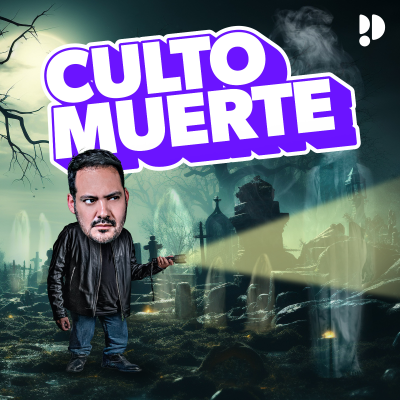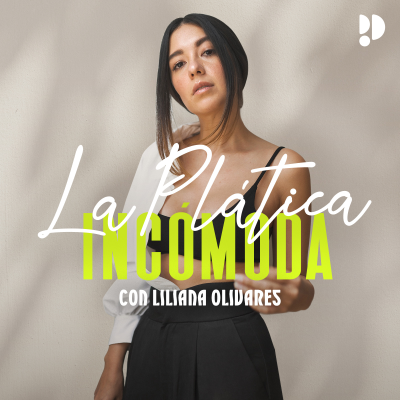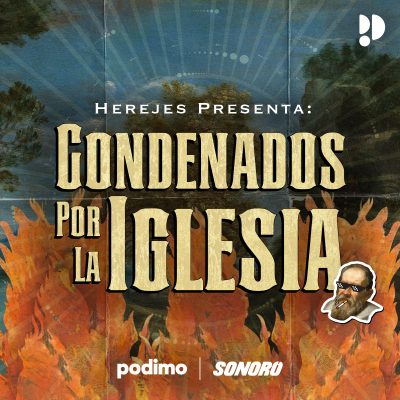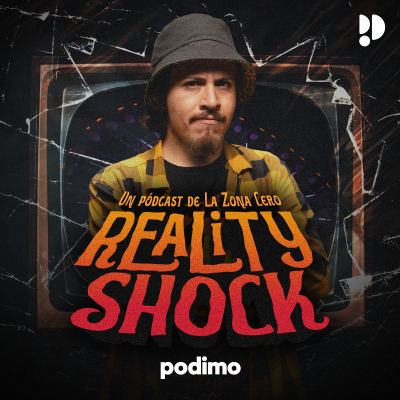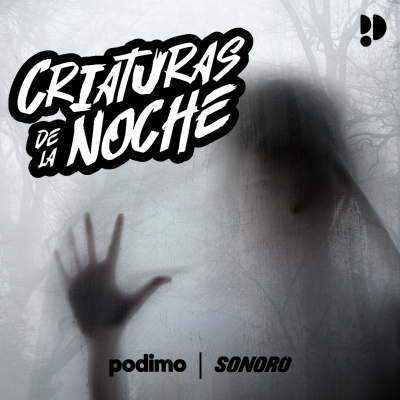
We're All Insane
inglés
Desarrollo personal y salud
Empieza 7 días de prueba
$99 / mes después de la prueba.Cancela cuando quieras.
- 20 horas de audiolibros al mes
- Podcasts solo en Podimo
- Podcast gratuitos
Acerca de We're All Insane
A podcast where real people share raw, unfiltered stories about their lives, challenges, and traumas that have shaped them. Each episode offers a deep dive into the unique journey of the guest—No scripts. No interruptions. Just authentic storytelling that unfolds naturally, in the guest's own words. If you have a story you'd like to share on the podcast, please send an email to wereallinsanepodcast@gmail.com or fill out a form here: https://docs.google.com/forms/d/e/1FAIpQLSfUFf5ushHFd57GAZ2hAg5vvTSZNQxlOaRutdjggN-HQjufYw/viewform
Todos los episodios
177 episodiosDaughter of a Killer
#foryou #podcast #ad Feel like your best self again. Visit https://forhers.com/insane to get a personalized, affordable plan that gets you. -We're All Insane Plus for Bonus Episodes, Ad-Free Listening, Access to New Show, Guided Mediations: https://wereallinsane.com - OFFICIAL MERCH NOW AVAILABLE - code INSANE10 gets you 10% off for a limited time [https://were-all-insane.myshopify.com/] - Join We’re All Insane Mailing List for EXCLUSIVE Content + Discounts [https://mailchi.mp/6d0e5d7a3998/were-all-insane] Karah was raised by strong single women after her father went to prison when she was just three months old, Karah opens up about the beauty and the chaos of her childhood — from family love and resilience to addiction, prison sentences, and unimaginable challenges. She shares what it was like navigating life with an incarcerated parent, becoming a mother at 19, and ultimately choosing to rise above the hand she was dealt. Karah's Links: Facebook: https://www.facebook.com/karah.koger?mibextid=wwXIfr&rdid=pxXWf8WnZTeDmVsC&share_url=https%3A%2F%2Fwww.facebook.com%2Fshare%2F1AityJVwwj%2F%3Fmibextid%3DwwXIfr Instagram: karah-koger TikTok: @motomom263 If you have a unique story you'd like to share on the podcast, please fill out this form: https://forms.gle/ZiHgdoK4PLRAddiB9 or send an email to wereallinsanepodcast@gmail.com Learn more about your ad choices. Visit megaphone.fm/adchoices [https://megaphone.fm/adchoices]
Drugged and R*ped at Work Party
#foryou #podcast #ad Merch is live ↓ - OFFICIAL MERCH NOW AVAILABLE - code INSANE10 gets you 10% off for a limited time: https://shop.wereallinsane.com - Join We’re All Insane Mailing List for EXCLUSIVE Content + Discounts: https://mailchi.mp/6d0e5d7a3998/were-all-insane Support your cells and how you age with Mitopure® Gummies from Timeline. Visit https://timeline.com/insane and save up to 39% off your Mitopure® Gummies. Make the switch to Sundays. Go right now to https://sundaysfordogs.com/INSANE50 and get 50% off your first order. Or, you can use code INSANE50 at checkout. At 21, Tressa was drugged, abducted, r**ed, and nearly strangled to death by a stranger. She was left barely alive. Tressa talks about what survival really looks like after something like that. Not the inspirational version. The real one — the fear, the anger, the way your whole sense of safety disappears. Time Stamps: 00:00:00 – What is it like to survive being abducted, drugged, raped, and strangled twice? 00:03:33 – What happened at a work party that led to a violent assault? 00:06:23 – How can someone be drugged at a bar by a coworker? 00:09:45 – What does it feel like to regain consciousness during a sexual assault? 00:12:09 – What do predators say during an attack to psychologically dominate their victim? 00:14:49 – What kind of long-term physical damage can violent rape cause? 00:16:02 – What does fight, flight, or freeze feel like during a life-threatening assault? 00:17:15 – How can something as small as a worn-out belt save someone’s life? 00:18:37 – Why do some victims pretend to be dead to survive? 00:22:22 – Why would an attacker leave to dispose of a body they believe is dead? 00:25:24 – What happens when a roommate unexpectedly interrupts a violent assault? 00:31:35 – What is it like telling your father you’ve just been raped? 00:35:29 – What happens during a rape kit exam at the hospital? 00:37:23 – Why does a sexual assault exam feel like a second violation? 00:40:56 – Why are sexual assault survivors forced to repeat their story over and over again? 00:42:48 – How do investigators sometimes gaslight sexual assault victims? 01:23:47 – How did trauma impact her romantic relationships years later? 01:25:08 – What happens when DNA evidence confirms your attacker’s identity? 01:35:01 – Why do survivors blame themselves for taking a drink or what they were wearing? 01:39:27 – What was the plea deal offered to the man who drugged and raped her? 01:40:48 – Why did she need multiple surgeries and eventually a colostomy bag? 01:41:00 – How does it feel when the justice system minimizes your trauma? 02:02:41 – What sentence did the attacker receive and how long did he serve? 02:03:02 – Why doesn’t she resonate with the word “survivor”? 02:10:16 – What happens emotionally when your attacker is released from prison? 02:11:22 – How did PTSD resurface years later during the pandemic? 02:11:59 – How do you cope knowing your attacker is living in the same city? If you have a unique story you'd like to share on the podcast, please fill out this form: https://forms.gle/ZiHgdoK4PLRAddiB9 or send an email to wereallinsanepodcast@gmail.com Learn more about your ad choices. Visit megaphone.fm/adchoices [https://megaphone.fm/adchoices]
Stroke at 18 Years Old
OFFICIAL MERCH NOW AVAILABLE - code INSANE10 gets you 10% off for a limited time [https://were-all-insane.myshopify.com/] Join We’re All Insane Mailing List for EXCLUSIVE Content + Discounts [https://mailchi.mp/6d0e5d7a3998/were-all-insane] Courtney was 18 years old when she had a massive stroke that almost killed her. One minute she was on vacation, the next she was being life-flighted and told something was seriously wrong. Doctors later discovered sepsis and two holes in her heart she never knew existed. Courtney's Links: Instagram: https://www.instagram.com/courtney_fullmer?igsh=c2w1ZGU2OGRqcWds&utm_source=qr Tiktok: https://www.tiktok.com/@courtneyfullmer?_r=1&_t=ZT-92w7XmzRc33 Youtube: https://youtube.com/@courtney.fullmer?si=3N9SCj82LivAb9og Time Stamps: 00:00:00 – What does it feel like to have a stroke at 18 years old? 00:01:10 – Can you be perfectly healthy and still have a stroke? 00:02:35 – What was life like right before a medical emergency at a young age? 00:04:55 – How grief and emotional stress impact the body physically 00:07:15 – What are the earliest stroke symptoms most people ignore? 00:09:45 – How do you know when something is seriously wrong with your body? 00:12:30 – Why young people dismiss major health warning signs 00:15:45 – Can physical activity or water sports trigger a stroke? 00:17:50 – What does a stroke feel like while it’s happening in real time? 00:19:20 – What happens when one side of your body suddenly stops working? 00:20:40 – What does it feel like when you can’t speak but know what you want to say? 00:22:45 – Can you pass out during a stroke and not realize it? 00:24:30 – How do people recognize stroke symptoms in an emergency? 00:26:45 – Why timing matters so much during a medical emergency 00:28:50 – How lack of cell service almost delayed life-saving care 00:31:30 – What happens when doctors don’t immediately know the cause of a stroke? 00:34:55 – What is LifeFlight and when is it used in emergencies? 00:38:20 – How faith and spirituality can show up during medical trauma 00:41:40 – When do stroke symptoms fully register mentally? 00:44:10 – Why losing the ability to speak is more terrifying than pain 00:46:45 – What it’s like arriving at the ER as an 18-year-old stroke patient 00:51:00 – Can birth control cause blood clots and strokes? 00:53:10 – What is an ischemic stroke vs a hemorrhagic stroke? 00:55:25 – Why stroke medication has a strict time window 00:58:50 – What recovery really looks like after a stroke at a young age 01:02:30 – How long does stroke rehab take for speech and movement? 01:07:45 – What people don’t understand about relearning how to talk and swallow 01:12:40 – How a stroke changes your identity and sense of self 01:18:30 – The mental health aftermath of surviving a stroke young 01:25:10 – What life looks like years after a traumatic medical event 01:31:45 – How long-term rehab reshapes patience, resilience, and hope 01:39:20 – What surviving a stroke teaches you about life and priorities 01:47:30 – What she wants young people to know about listening to their bodies If you have a unique story you'd like to share on the podcast, please fill out this form: https://forms.gle/ZiHgdoK4PLRAddiB9 or send an email to wereallinsanepodcast@gmail.com Learn more about your ad choices. Visit megaphone.fm/adchoices [https://megaphone.fm/adchoices]
Lost My Virginity to My Stepbrother and Got Pregnant
#foryou #podcast #ad Merch is live ↓ https://were-all-insane.myshopify.com Feel like your best self again. Visit https://forhers.com/insane to get a personalized, affordable plan that gets you. Laura shares how she lost her virginity to her much older stepbrother, got pregnant, and had an abortion she instantly regretted. We talk guilt, infertility, believing God was punishing her, and the adoption journey that finally forced her to face it all.Laura's Links:Abortion routing services: https://www.plannedparenthood.org/planned-parenthood-illinois/patient-resources/whether-youre-in-illinois-or-from-another-stateAngel Adoption (the service we used to adopt and where birthmothers can go to as well): angeladoptioninc.comTiktok: @helloitslbo Time Stamps: 00:00:00 – What happens when you lose your virginity to your stepbrother? 00:01:12 – Why do people stay silent about traumatic family secrets for years? 00:02:48 – Is it normal to carry guilt for something that happened decades ago? 00:04:20 – How does growing up around teen pregnancy shape your fear of becoming one? 00:06:02 – What does it feel like to never feel desired growing up? 00:07:56 – Can attraction happen instantly even when it feels wrong? 00:09:05 – Is it possible to feel chemistry with someone you just met at a family wedding? 00:10:39 – What goes through your mind when your stepbrother kisses you in public? 00:11:52 – Did anyone notice the inappropriate relationship at the wedding? 00:13:58 – Why do taboo relationships sometimes feel more intense? 00:15:18 – How quickly can a secret relationship escalate into sex? 00:16:32 – What is it like losing your virginity later than everyone else? 00:18:28 – What do you do when you find out the man you slept with has a girlfriend? 00:19:59 – Did her parents ever find out about the relationship? 00:21:10 – What happens when someone cuts you off right after intimacy? 00:22:29 – How do you know you’re pregnant before taking a test? 00:23:53 – What happens when you can’t access emergency contraception in time? 00:25:08 – How does shame affect decision-making during an unplanned pregnancy? 00:26:35 – What does it feel like when the father pressures you to get an abortion? 00:29:34 – Why do some men act flirty even when paying for an abortion? 00:31:13 – What actually happens during an abortion procedure? 00:33:34 – Can you regret an abortion immediately after it happens? 00:36:02 – Why do pregnancy jokes trigger panic years later? 00:37:52 – Can religion cause lifelong fear after an abortion? 00:39:15 – Why do some couples struggle with infertility after trauma? 00:41:28 – Is it possible to be pro-choice but regret your own abortion? 00:43:56 – What does repeated adoption failure do to your mental health? 00:52:32 – How can therapy help release guilt tied to reproductive trauma? If you have a unique story you'd like to share on the podcast, please fill out this form: https://forms.gle/ZiHgdoK4PLRAddiB9 or send an email to wereallinsanepodcast@gmail.com Learn more about your ad choices. Visit megaphone.fm/adchoices [https://megaphone.fm/adchoices]
Being Gay in a Homophobic House
Official Merch - NOW AVAILABLE! [https://were-all-insane.myshopify.com] #foryou #podcast #ad TIMELINE: Don’t let another year go by feeling less than your best. Grab 30% off your first month of Mitopure Gummies at https://timeline.com/insane30 Ari's adoption was supposed to save her life — but instead exposed her to abuse, neglect, and deep rejection. Taken in by family while her parents were gone, Ari grew up never being accepted for who she truly was, especially as a lesbian. This is a raw conversation about the dark side of adoption, family betrayal, and the lasting damage of being punished for your identity. Time Stamps: 00:00:00 — What happens when a child is adopted while both parents are incarcerated or addicted? 00:02:10 — What is it like growing up bouncing between homes as a young child? 00:04:05 — How does growing up in an image-obsessed household affect a traumatized child? 00:06:00 — Why do some parents prioritize appearance over a child’s emotional needs? 00:08:20 — How do controlling parents react to LGBTQ families and friendships? 00:10:45 — Why do some parents fear their child being gay before the child even knows? 00:13:00 — How do abandonment issues form when a parent frames themselves as a savior? 00:15:05 — What happens when a teen is forced to come out during a moment of fear? 00:17:30 — How is religion weaponized against LGBTQ children? 00:19:00 — What does emotional abandonment look like after coming out? 00:21:10 — How does isolation become a punishment for queer teens? 00:23:15 — Why doesn’t punishment or control change someone’s sexuality? 00:25:30 — What does it mean when a parent becomes violent over “white lies”? 00:27:40 — How does humiliation become a tool of control in abusive households? 00:29:50 — Why do teens run away when emotional abuse escalates? 00:32:10 — What actually happens when CPS gets involved in family conflict? 00:34:20 — Why do abuse survivors minimize their experiences when authorities ask? 00:36:30 — What does it feel like to learn you were never legally adopted? 00:38:45 — Why do children return to abusive homes even after escaping? 00:41:00 — How does financial control replace emotional care in toxic families? 00:43:10 — Why do abusive parents spread lies to isolate one child from the family? 00:45:20 — How does parental manipulation damage sibling relationships? 00:47:30 — Why do abuse patterns repeat in adult romantic relationships? 00:49:45 — How does childhood trauma shape attachment and self-worth in adulthood? 00:52:00 — What happens when adult children go no-contact with a parent? 00:54:20 — Why do adult children still crave validation from abusive parents? 00:56:40 — How do survivors grieve a parent who is still alive? 00:59:00 — What does healing look like after going no-contact? 01:02:30 — How do survivors redefine family after losing their parent relationship? 01:06:00 — How do you accept that a parent may never change? If you have a unique story you'd like to share on the podcast, please fill out this form: https://forms.gle/ZiHgdoK4PLRAddiB9 or send an email to wereallinsanepodcast@gmail.com Learn more about your ad choices. Visit megaphone.fm/adchoices [https://megaphone.fm/adchoices]
Elige tu suscripción
Premium
20 horas de audiolibros
Podcasts solo en Podimo
Podcast gratuitos
Cancela cuando quieras
Empieza 7 días de prueba
Después $99 / mes
Empieza 7 días de prueba. $99 / mes después de la prueba. Cancela cuando quieras.





